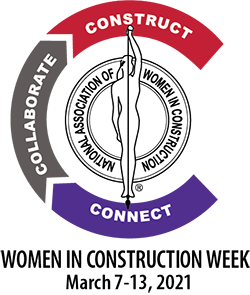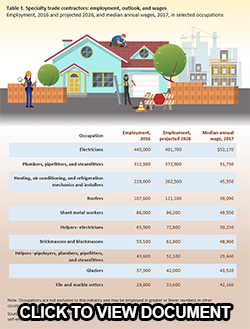Busting the Myths of Construction Careers
 23 February 2021
23 February 2021 

Busting CONSTRUCTION CAREER Myths & Highlighting Education Opportunities
Build Your Future Arizona reports that by September of 2022, 155,000 construction science technology professionals will be needed in Arizona. There are so many opportunities in construction! Nearly anyone just out of high school to those seeking a career change can not only find a job, they can also have a career.
Careers in construction offer a world of opportunity and high wages. Build Your Future Arizona (BYF Arizona) also reports that construction professionals earn $4,803 more dollars per year than recent college graduates. Despite that, there are myths about careers in the trades that continue to spread. BYF Arizona busts some of the most widespread myths. In fact, the term “trades” no longer applies. Today the proper terminology that applies to people working in construction is “construction science technology professions/professionals.”
Myth #1: The construction industry isn’t for women.
FACT: Women are flourishing in construction sciences.
 According to the United States Department of Labor, more than 939,000 women were working in construction in the U.S. in 2016, up from about 800,000 women in 2010.
According to the United States Department of Labor, more than 939,000 women were working in construction in the U.S. in 2016, up from about 800,000 women in 2010.
There are so many women working in construction that there is a professional organization just for them; the National Association of Women in Construction (NAWIC). NAWIC is committed to championing women to impact the direction of the construction industry. NAWIC provides education, community, and advocacy for women. Arizona has two chapters, Greater Phoenix and Tucson. NAWIC’s Women in Construction (WIC) Week coming up, March 7-13, 2021 will highlight women as a viable component of the construction industry. Thousands of NAWIC's members from across the country will promote the opportunities available for women in construction and emphasize the growing role of women in the industry.
NAWIC Tucson will hold a virtual event on March 10th. Seasoned and new female construction professionals will connect and meet local female students enrolled in various construction education programs. Industry, education, scholarship information, and trivia are among the activities. Details can be found at www.nawictucson.org.
“We are very fortunate to have so many amazing women leaders in the construction industry and professionally supporting women here in our own community,” said Ann Vargas, Tucson WIC Week chairwoman.
The Greater Phoenix Chapter of NAWIC has a week filled with events. Click here for details. The chapter recently created a “Girl Power Coloring Book.” Its purpose is to help girls and boys see role models succeeding in the construction industry. “With so few role models for girls, this will lay the groundwork for a future with more diversity and especially more women working in the construction industry,” said Carol Hagen, Phoenix WIC Week chairwoman.
The virtual coloring book will be distributed to schools beginning and February 25th and available online at www.nawicphoenix.org shortly thereafter.
Myth #2: There is little demand for construction workers.
FACT: Construction in the U.S. is booming.
In June 2018, there were 263,000 job openings in the construction industry, according to preliminary estimates from the U.S. Bureau of Labor Statistics (BLS). Through 2026, BLS projects faster-than-average employment growth in the industry. Preliminary BLS data shows that there were 7.2 million construction jobs in July 2018. That marks the highest employment level for the construction industry in a decade.
Myth #3: Construction jobs do not pay well.
FACT: Many construction professionals earn more per hour than the average university graduate – and without the student debt.
 BLM reports the median annual wage of $45,820 in 2017 surpassed the $37,690 median wage for all industries. Specialty contractors is the largest construction subsector, with employment projected to reach nearly 4.8 million by 2026. Professionals in this subsector usually focus on a particular activity, such as plumbing or roofing.
BLM reports the median annual wage of $45,820 in 2017 surpassed the $37,690 median wage for all industries. Specialty contractors is the largest construction subsector, with employment projected to reach nearly 4.8 million by 2026. Professionals in this subsector usually focus on a particular activity, such as plumbing or roofing.
Entry-level employees in the construction sciences industry earn an average of $31,910 annually, while the national average for entry-level salaries among all industries is only $28,000 per year, according to Glassdoor. Throughout a career, an average construction professional’s annual salary continues to be greater than the overall national average annual salary. Skilled positions, such as plumbers and electricians, can make $50,000 or more per year. The median salary for Construction Project Managers in Arizona is $82,790.
When you pair these significantly higher salaries with little to no student loan debt, skilled construction science professionals are getting a head start on their careers and making a great living sooner than students who attend college. With many opportunities for career advancement and increasing salaries, these professionals are set to enjoy financial security and a comfortable lifestyle from an early age.
Jeff Fleetham, Director, Arizona Registrar of Contractors sums it up. "Construction science technology professions are open for anyone wanting meaningful career and virtually unlimited earnings without the debt associated with a four-year degree.”
Myth #4: Construction is a dead end for people without useful skills.
FACT: Many construction specialties require advanced training.
Construction sciences is a highly technical industry that requires intelligent and skilled workers that utilize both technical and problem-solving skills to create and build some of the most advanced projects in the world. Construction sciences utilize different educational tracks including apprenticeships, internships, various credentialing programs, and even multiple college degree options in construction management, business management, engineering, economics, architecture, and business administration.
Construction Education Opportunities
There are many Career & Technical Education (CTE) programs for high school students and young adults across the state. These are just a few.
East Valley Institute of Technology (EVIT) has two campuses in Mesa, one in Apache Junction, and one in Fountain Hills, and provides hands-on skills in various disciplines of commercial and residential construction. Disciplines include electrical wiring, plumbing, masonry, framing, roofing, drywall, and finish work.

Pima Joint Technological Education District (JTED) serves students from public, private, charter, and home schools, plus students who have not earned a diploma or GED and are under 22-years-old. There are campuses throughout Pima County, Santa Cruz Valley, Nogales, Mammoth, and San Manuel. Construction and construction-related programs include cabinetmaking, carpentry, heavy equipment operations, HVAC, electrical, masonry, carpentry, or plumbing.
In the Phoenix area, Western Maricopa Education Center (West-MEC) offers General Construction Technology. This one-year program prepares students to enter the residential and commercial construction industry. Students will learn estimating, concrete, masonry, framing, drywall, basic electrical, basic plumbing, roofing, hand and power tools, rigging, and materials handling, along with site safety. West-Mec also offers programs in air conditioning, electrical, and masonry.
Metro Tech offers construction CTE programs through the Phoenix Union School District.
Northern Arizona Vocational Institute of Technology NAVIT is located in Snowflake and also has campuses in Show Low and St. John's for welding.
Flagstaff High School offers welding and woodworking at two of its CTE programs.
Apprenticeship Programs
The Arizona Department of Economic Security explains the apprenticeship program. An apprenticeship combines on-the-job-training experience with related classroom instruction. Apprenticeships last one to six years, with the average being three to four years. Graduates who successfully complete their apprenticeship training will receive a nationally recognized completion certificate. In this regard, an apprenticeship is considered "the other four-year degree." Apprentices earn a salary while learning their craft.
“Apprenticeships offer training and on-the-job experience while earning a paycheck at the same time. Few industries offer this type of earn-while-you-learn opportunity,” said Fleetham.
Click Here for a list of registered apprenticeship programs in Arizona.
Podcast
Build Your Future Arizona reports by September of 2022, 155,000 construction science technology professionals will be needed in Arizona. Nearly anyone just out of high school to those seeking a career change can not only find a job, they can also have a career. The earnings potential can be huge too! Carol Hagen talks about the National Association Of Women In Construction and the opportunities it can afford to women. Jeff Fleetham, Director Of The Arizona Registrar Of Contractors, discusses ways you can learn skills and in some cases make money as you learn.
###
Photo Credits:
- U.S. Bureau of Labor Statistics
- NAWIC
- Shutterstock
RELATED CONTENT:
- Build Your Future Arizona
- National Association of Women in Construction Phoenix Chapter
- National Association of Women in Construction Tucson Chapter
- National Association of Women in Construction National
- Arizona Department of Economic Security
- Arizona Registrar of Contractors
- U.S. Bureau of Labor Statistics
- EVIT: East Valley Institute of Technology
- JTED: Pima Joint Technological Education District
- West-MEC: Western Maricopa Education Center
- CTE Program: Metro Tech
- NAVIT: Northern Arizona Vocational Institute of Technology
- CTE Program: Flagstaff High School
Print this page
recent post
- Duck, Duck, Duct! How Often Should Ductwork Be Cleaned?
- Vinyl vs. Fiberglass Windows: Which Is The Better Choice Of Replacement Window?
- We May Be The Grand Canyon State, But The Rocky Mountains Are Important For Arizona
- Welcome to Arizona! Things A Newbie to Arizona Should Know
- The Pros & Cons of Buying A Flipped House
- Getting In On The Ground Floor
- Why It’s More Critical Than Ever To Get Your AC Serviced Before Summer
- The Reality of Remodeling
- What To Look For When Comparing Your Roofing Quotes
- What To Expect When Buying New Windows & Doors
